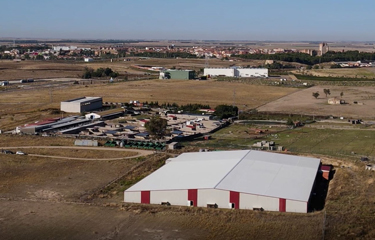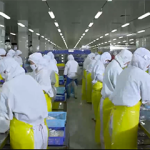Noray Seafood pioneering “microbiome” shrimp-farming in Europe

Medina del Campo, Spain-based Noray Seafood has advanced its proprietary “microbiome” technique for shrimp farming to commercial viability, and is now seeking to expand in Europe, according to Bjorn Aspheim, the company’s founder.
Founded in 2008, Noray Seafood took more than a decade and EUR 14 million (USD 16.6 million) to develop and hone its microbial, land-based saltwater system for farming whiteleg shrimp (Litopenaeus vannamei) to the point where it could produce commercial volumes of vannamei. Known as Gamba Natural until 2020, when the company rebranded, it now operates a fully vertically integrated production facility, including the first commercial shrimp hatchery in Europe, at its pilot plant in northwest Spain, and Noray Seafood CFO and COO Lars Backer told SeafoodSource the company is ready to expand to multiple locations throughout Europe, with a target annual production capacity of 25,000 MT by 2027.
“We can proudly say that we are pioneers in Europe and are pleased to have achieved stable production on a commercial scale, in a fully sustainable way. We are the first producers in the world to achieve a 100 percent vertical integration of the production process from spawning to ready to eat shrimp at an indoor sustainable facility,” he said.
Backer, who joined Noray Seafood in March 2021 from JP Morgan's Investment Bank in London, is now talking to investors to help with the expansion phase and is positive about the current interest in aquaculture.
“Having achieved stable production, we are now looking to find the right partners who are equally interested in expanding the production of our sustainable, high-quality, protein-rich shrimp, to cater [to] an increasing customer appetite,” Backer said.
Noray Seafood uses a microbial farming system that Backer said is both more efficient and cheaper to run than recirculating aquaculture systems used by other land-based shrimp farming operations.
“Microbiome systems control the water quality through a self-nitrification process with zero water exchange. The shrimp use the microorganisms as an additional source of feed, which increases productivity and reduces feed-conversion ratio,” he said.
Noray’s “Climate Smart” system implements strict control of oxygen, salinity, ammonia, bacteria, and floc levels, creating ideal growing conditions while eliminating the need for antibiotic use.
“Farming indoors, using artificial saltwater, and enforcing strict biosecurity measures are also effective at minimizing the risk of disease,” he said. “A further advantage of our integrated production is that in-house processing guarantees a maximum of one hour between harvest and packaging, and a short-traveled, premium-quality shrimp that can be delivered fresh or cooked within 24 to 48 hours from harvest."
A further technology advancement achieved by Noray has been the shortening of the time it takes to grow a shrimp from post-larvae to market size to just 90 days. Noray decided to build its own hatchery soon after it was founded, due to the difficulty of obtaining a reliable supply of high-quality post-larvae. The pilot farm footprint covers seven hectares and has a capacity for 24 tanks, with the capacity to produce more than 70 metric tons (MT) per year, in a country that consumes more than 180,000 MT of shrimp annually.
“The aim is to increase capacity at the hatchery, build new modular units, and expand our packaging and processing area to increase production of our ultra-fresh shrimp,” Backer said.
The shrimp, which is produced without the use of sulphites, colorants, chemicals, or antibiotics, has become popular in Spain. It is now sold through the company’s online shop as well as in supermarkets and high-end restaurants in Spain. A growing number of retail outlets are also showing interest, Backer said, and Norway just completed its first sales in Norway this month.
Noray Seafood achieved Aquaculture Stewardship Council certification in August 2021, becoming the first land-based shrimp farm to do so, and has subsequently received chain of custody certification, which allows the company to use the ASC logo on its products.
“Meeting the demand for proteins, within environmental limits, and working to meet the U.N.’s Sustainable Development Goals, is one of the biggest challenges for the global food industry in the 21st century," Backer said. "Consumers are increasingly conscious about using sustainable food alternatives and we are committed to taking on this challenge.”
Photo courtesy of Noray Seafood






Share